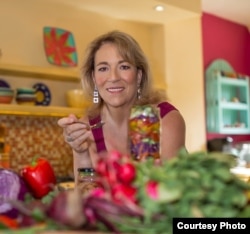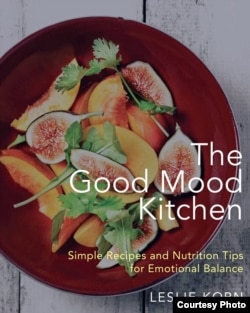A chocolate bar may make you feel better when you're down, but a cup of yogurt or a handful of cashews might be a better choice.
"I think about our body in some ways like a car engine," says therapist Leslie Korn. "We need to give it the right fuel. And each of us have a need for a particular combination of proteins, and carbohydrates and fats."
Korn has been treating people for trauma and depression for more than 40 years. She noticed that when her patients changed their diet and began eating foods like dark chocolate, sweet potatoes, eggs and cherries, they had much more success in lifting their depression and decreasing their pain.
She turned her observations into a book: The Good Mood Kitchen. It contains recipes and nutrition tips that can help put you in a good mood.
Fat for the brain
Fats, she explains, are not the nemesis many diets have made them out to be. We need fats in our diet because our brain is made up of fat. "It's made up of chemicals that talk to each other and that are lubricated by the fat in order to communicate across the synapses, and contribute to our ability to focus, to apply attention and to lift our mood. Indeed, there is some very good research going on in the military looking at the role of Omega 3 fatty acids for not only treatment of depression and anxiety, but also for suicide prevention."
Taking care of the digestive system, which breaks down the fat, is essential for the brain to benefit, and Korn has a suggestion for that, too.
"For example, if your liver and if your gallbladder is not working, you can't break down fats that are absorbed into the blood stream and then support brain function. What we know is that the greens, in particular bitter greens, help us digest fats and send those fats to the brain where we need it."
The Brainbow diet
Those greens are part of what Korn calls the "Brainbow" diet. She says the colors in the food represent different nutrients. "Your orange, and kind of yellow foods provide lots of vitamin A, lots of vital nutrients. The variety of greens are very good for our digestion. Your purple food and your red food are very anti-inflammatory. These are beets and our eggplants and our berries."
The "Brainbow" Food list also includes:
Red foods: red cabbage, radishes, watermelons
Orange foods: carrots, sweet potatoes, oranges, pumpkins
Yellow foods: lemons, bananas
Green foods: kale
White foods: garlic, onion, nuts
Foods for every symptom
Therapist Korn says probiotics are important in treating depression and lifting our mood. She calls them "psychobiotics." Those can be found in yogurt and fermented food.
For people who suffer from PTSD (Post Traumatic Stress Disorder), she recommends foods rich in Omega 3 fatty oils like salmon, flaxseed oil and nuts.
Cocoa and chocolate are known to be good for improving the brain's cognitive function.
Caffeine helps the brain focus. It stimulates the brain to release dopamine, a chemical messenger that helps in the transmission of signals in the brain and other vital areas.
Cherries and chamomile help the brain release melatonin and anti-anxiety chemicals for a good night's sleep.
Around the world with good mood food
Every country, Korn says, has certain foods that enhance mental well-being. In her book, she offers recipes for them — fresh raw sauerkraut from Eastern Europe, kimchi from Korea and miso soup from Japan. Plantain is a popular food in India, Mexico and countries in Africa and the Caribbean. The Good Mood Kitchen includes a recipe for Plantain Soup.
"Plantains are large bananas, very starchy and a little bit sweet. And I add some lemon, and butter and chopped onion, and garlic. And you make it with either a vegetable broth or a chicken broth. Then you add coconut milk, and blend. And then I top it with cilantro, Chinese parsley and garlic, grated orange peel and lime juice."
Sweet potatoes are familiar to people around the world. In her book, Korn offers a simple recipe for preparing them. "Add butter, sea salt and bake. This is good for stress."
Relax and savor
Korn says because mood follows food, we have to improve our digestion in order to improve our mental health. And since stress and hyperactivity slow down the enzymes our body releases to digest food, once you have prepared a dish designed to improve your emotional balance, it's important to slow down, take some deep breaths, relax and enjoy eating the meal.
Good Mood Recipes
Baked Wild Salmon
Sprinkle sea salt and a little olive oil on the salmon and place it on a cookie sheet.
Bake for 10 minutes at 350 degrees, then place it under the broiler for at least 5 minutes.
Keep an eye on the salmon. It should be pink on the inside.
Garlic Yogurt Salad Dressing
½ -3/4 cup plain cow or goat milk yogurt
1 small garlic clove (minced)
¼ tsp. dried basil
½ tbsp. apple cider vinegar
1/16 tsp. stevia powder
1 tsp. chopped fresh parsley
4 tbsp. organic mayonnaise
Whisk all ingredients together in a bowl and serve.








